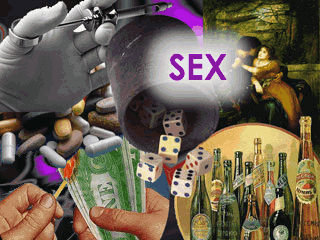66 Self-Karma

“I have seen the enemy
…and he is us.”

Card messages in the Illuminated position.
+ Attachment
(Bond, fan, gourmand, preference, habit, rule, practice, predilection)
- Attachment to patterns that give a desired payoff may evolve these into a talent! Aptitude in an endeavor is the payoff for repetition. Don’t let it become a rut.
- Friendships, loved one, ideas, faith, sacred rituals and beliefs are all useful attachments. They are the glue and the gravity which bond us to each other and station us on a ground of being. Each Self-Karma is a distinct pattern that may hinder or empower you. Someone’s personal pattern is dominating the conversation. Does this person contribute effectively? Corporate America loves a workaholic, spouses hate them.
- A desirable attachment, one with much significance is called a bond. Reach out and make a new bond.
Quotation Illustrating this concept…
Quotation Illustrating this concept…
- “How people treat you is their karma; how you react is yours.” Wayne Dyer
- “Send that instant karma to me; initial it with loving care, yourself.” Yes – All Good People
- “Habit is habit, and not to be flung out of the window by any man, but coaxed downstairs a step at a time. ~Mark Twain
- “Habit is a second nature which prevents us from knowing the first, of which it has neither the cruelties nor the enchantments. ~Marcel Proust
Card messages in the Shadow position.
– Addiction
(Compulsion, urge, dependency, craving, second nature, craze, mania, phobia, preoccupation, fetish)
- When we are blind to our patterns, they have us. We are addicted to them. Use awareness to transform a habit into an option, otherwise you are stuck in a rut. Don’t dig yourself in any deeper.
- When compulsion makes you do something, then you are no longer free. Face that urge and overcome it.
Quotation Illustrating this concept…
Quotation Illustrating this concept…
- Men are not punished for their sins, but by them.” ~Elbert Hubbard
- “Whoso diggeth a pit shall fall therein.” ~Proverb
- “People pay for what they do, and still more, for what they have allowed themselves to become. And they pay for it simply: by the lives they lead.” ~Edith Wharton
- “When an inner situation is not made conscious, it appears outside as fate.” ~ Carl Jung
- “Every kingdom divided against itself is brought to desolation; and every city or house divided against itself shall not stand.” ~New Testament: Matthew 12:25
Relevance within the Michael Teaching
 So much of what can entrap a person in a habit or compulsive behavior we can list under the category of Self Karma. As the name implies a Self-Karma is primarily an unresolved pattern that has caused the development of an individual Essence to be held in a holding pattern. As such, when a Personality is imbued with that tendency, the objective is to resolve the underlying fear of unsatisfied need that perpetuates a set of behaviors or beliefs which hold that person in a circular stalemate.
So much of what can entrap a person in a habit or compulsive behavior we can list under the category of Self Karma. As the name implies a Self-Karma is primarily an unresolved pattern that has caused the development of an individual Essence to be held in a holding pattern. As such, when a Personality is imbued with that tendency, the objective is to resolve the underlying fear of unsatisfied need that perpetuates a set of behaviors or beliefs which hold that person in a circular stalemate.
Unlike Karma, which requires the presence of another person or object where there is a historical connection or cord binding the two in specific patterns or imbalance, a Self Karma is an issue one brings to the relationship and those attitudes and behaviors are played out with the other person being the one who is merely the trigger. This is not so imply that in a given relationship there are not many possible combinations of factors operating in parallel: agreements, monads, karmas, internal monads, review or rejection of imprinting and the activities of Chief Features.
Self Karma’s, like Karma, may feel intense and recursive. Referred to as one’s issues, patterns bearing particular themes may actually serve an individual whose taste or preferences are biased in such a way as to influence other life choices. In some cases Life Task may utilize these patterns as a supporting element in the pursuit of an outcome or style of Personality. Also, like Karma’s, these individual patterns are activated in a Personality by Essence. Narrowing the scope or number of Self Karma’s relieves the Personality from either extreme dysfunction and stress. However, at times when Essence determines that the progression of a Personalities growth has reached a certain stage or apex, it may introduce other traits that are in queue to be addressed. Those in the Goals of Growth, Acceptance, and Discrimination are most likely, in that order, the have Self Karma’s stacked in ways that the more they achieve parity or resolution, the greater the roll out of additional Self Karma’s.
Because the developmental cycle of a person, which falls under the Michael Teaching concept of Internal Monads, a Self Karma’s might appear, or if already present is enhanced by a stage of life transition. For instance, one general example happens when a person is ready to emerge from imprinting in the Third Internal Monad and become more of themselves in the Fourth Internal Monad. Use the example of smoking (pot or cigarettes). In the early years when peer pressure is highest and risk taking behavior of adolescence looms high, a person who might not like the substance still do it to participate with their contemporaries. But when True Personality begins to surface in the 4th, the interest in those people will alter and the pull of that behavior loose its potency.
Self karma’s imply something detrimental and at the extreme destructive. Not necessarily. There are positive attachments called preferences or predilections, or tastes, and sometimes even talents. What causes these to come under this category is the rigid nature and automatic unconscious or default reaction which eschews awareness and analysis. Common phrases issued by those under the hold of a self karma is: “that is just who I am” or “that’s just what I do”, invoked as a deflection strategy to keep a person in the holds of that pattern. But these are not of the conscious Self but of the Ego working unconsciously from a desire to keep the safe and familiar in place.
Self Karma’s then are not evil nor sinful, but they are limiting and often stifling to one’s growth and evolution. Hence, the appropriate attitude to a Self Karma is not it’s extermination or elimination, but to understand its useful attributes and then having it become one of many options rather than a specific, predictable, and unchanging fall back position.
Hypnotherapy, Desensitization Therapy, Cognitive Therapy, and Emotional Freedom Work can be very useful in confronting the causes of any Self Karmic attitude or response. Behavioral changes like exercise programs or learning new skill sets can overcome the grip of a recurring pattern by replacing it with another one that offers new ways of doing. On some occasions, the brain’s chemical balance might have been genetically pre-configured or so greatly diminished by the stressful effects of these patterns; that supports like herbs, change of diet, and in the extreme anti-depressants, may be extremely helpful in supporting a change. Healing then requires a realignment of the receiver, which the brain is for the mind, and thus loosen the grip of that Self karma’s neural footprint. Adjusted biochemistry facilitates the emergence of alternative patterns. But pills or supplements alone do not make the change, they just increase the malleability of the old habit and loosen its grip upon you. Too often, people get on the drugs and fail to follow up with necessary spiritual, psychological, emotional or behavioral investigation required to bring about not just temporary cessation, but long term healing and advancement.
Remember, restoring choice to the Personality means equipping it with more than one default behavioral option or attitude toward a situation. Reversing this last statement, a belief, habit, response (in the case of a phobia), or attitude toward some set of circumstances may become a Self Karma when it becomes fixated and thus either overrules any other opinion or possibility, or so dominates other viewpoints within as to minimize them out of acceptance. There is no greater bread crumb of speech which may reveal a trail leading to a Self Karmic belief than the statement of response, “yes, but!” Try the frame of reference “that might be true, AND this is also the case.” You will undoubtedly notice that when more than one option, or two opinions in opposition are present, it is far more liberating to the mind and allows for the best use of your conscious ability to think rather than just praddle on reinforcing your own belief or position. (i.e. argue for your limitations.)
Famous Examples
Obsessive-Compulsive Disorder,
Cultural Meaning
They who can capture your attention and thus consume your time have you addicted to their substance. Framing that idea of addiction in this way puts into sharp relief an obvious factor but one that is often overlooked or not considered: the more time you spend doing anything the more you are attached to it! Of course, when someone loves what they do and is consciously devoted and even delighted by the use of their life force in pursuit of one of these preferred patterns (i.e. athletes, musicians, performers, inventors, activists, etc.) to name of few, then the idea of attachment takes on the flavor of something that is both wanted and has deliberate commitment. Imagine Van Gogh not being allowed to paint, or Michael Jackson not able to dance, or Thomas Edison not being allowed to tinker? They were bonded to these pursuits and they filled a vital niche for them.
But for many people, these predilections which make themselves visible in early life are often overruled by demands of family or culture or academe or survival deficiencies requiring them to be subordinated. Much of the way of talent, or a person’s authentic self, may have to capitulate and make do suppressing their nature urges or predilections. They then go underground; and instead of being forgotten they become distorted and the demands of their fulfillment persist. How they get fulfilled or manifest in their altered form may bring about all sorts of behaviors. If a person has been shamed for having various tendencies in the first place, the strategies one implements to get those suppressed needs met will tend to throw a person under the veil of secrecy in the pursuit of them. Or at the other extreme, consume the individual’s psyche so completely, that they engage in outright deviancy or extremism, both forms of Self Karmic and addictive attributes as to segment themselves into obsessive behavior.
 Perhaps no other addictive pattern so informs the modern psychic sphere of human experience than the cyber or virtual world of the Internet. In itself, the Internet is the first manifestation of the Global Mind, useful because it avails to the use avenues of exploration that might have been at one time out of reach. Yet, on the darker side of this potentially liberating technology is the deleterious effects of neural abduction. The diversity of messages that can be sent across this medium can captivate like no other before it. The arousal or excitement of the brain can lead to greater understanding of many things. Or, it may so utterly hypnotize the user with the sheer speed, complexity and volume of information, crowding out actual deliberation and cogitation of ideas and input, by engaging the user in activities or following designed patterns (product or message oriented) that a person becomes lost in a maze. Children are particularly susceptible to this phenomenon and the rise of cyber-addiction is becoming as significant as actual substance abuse.
Perhaps no other addictive pattern so informs the modern psychic sphere of human experience than the cyber or virtual world of the Internet. In itself, the Internet is the first manifestation of the Global Mind, useful because it avails to the use avenues of exploration that might have been at one time out of reach. Yet, on the darker side of this potentially liberating technology is the deleterious effects of neural abduction. The diversity of messages that can be sent across this medium can captivate like no other before it. The arousal or excitement of the brain can lead to greater understanding of many things. Or, it may so utterly hypnotize the user with the sheer speed, complexity and volume of information, crowding out actual deliberation and cogitation of ideas and input, by engaging the user in activities or following designed patterns (product or message oriented) that a person becomes lost in a maze. Children are particularly susceptible to this phenomenon and the rise of cyber-addiction is becoming as significant as actual substance abuse.
In a recent article in the Huffington Post one author defines the Four Addictions underlying all others:
They are:
- The Addiction to opinions of other people. As a society, we’re addicted to what others think about us and how others’ views of the world affect us.
- The Addiction to drama. Some people are drawn to and consumed by any event or situation that occupies their thoughts and fills their mind with negativity, which often brings attention to them in unproductive ways.
- The Addiction to the past. These people have an unhealthy attachment to events or situations that have occurred in the past. They’re stuck in how things used to be.
- The Addiction to worry. This addiction is comprised of all the negative and self-defeating thoughts that make us anxious, disturbed, upset and stressed, that hold us back in life.”
In many ways, these four addictions represent the inadequacies and thus the abdication of our personal power which protects and asserts our native right to be human. Hence, we might realize that Essence wants us to be free from the debilitating effect of these killers of imagination, hope, self love, and dreams which underscore our living and livelihood, and sustain the alcohol, drugs, food, gambling, or sex addictions which we use as medications. Obsessive Compulsive Disorder, ADD & ADHD, Schizophrenia, and Depression plague a huge cross section of the human family more so than ever before recorded, or perhaps admitted to. Substance abuse and mental illness are but symptoms or habitual effects and behaviors brought on by the four much deeper and fundamental causes which are the root cause of those symptoms. And these effects are caused by the tendency in human society to see “other” as different, flawed, and separate. Just as they do themselves. In actuality when because we can only love to the capacity we have to love ourselves, perhaps the Biblical injunction reprized by Jesus “love they neighbor as thyself” takes on a new context for understanding. Meaning, if we cannot love ourselves or do so conditionally, then that limited, skewed, or distorted love will be exactly what we give to others!
Review each of the Four Addictions with rigor and locate where you find them operate or appear in your life and the path to liberation, or as Michael and the Psychologists might formally term it “extinction” of that cause at the deepest level. When that happens the fears driving the four primary addictions will dissipate and a new world will be revealed from the inside out.
How can you distinguish a Karma from a self karma?
- If a pattern in your life seems to function regardless of who else is involved; this is a self karma.
- Any addiction that you fight with is a self karma.
- When you have an encounter with a specific person who calls forth from you behavior or emotions unlike anything you’ve had before, that is a karma.

